Have you ever wondered what kind of chips the gods are likely to much on ? If you are a Malayali the answer is “Plantain chips”, of course! All right , that was a bit over the top, but these chips are darn delicious. Chips, Onam , nostalgia.. be warned, this is going to be a rambling post. If you are here for the recipe, now is as good time as any to hit the jump button :-).
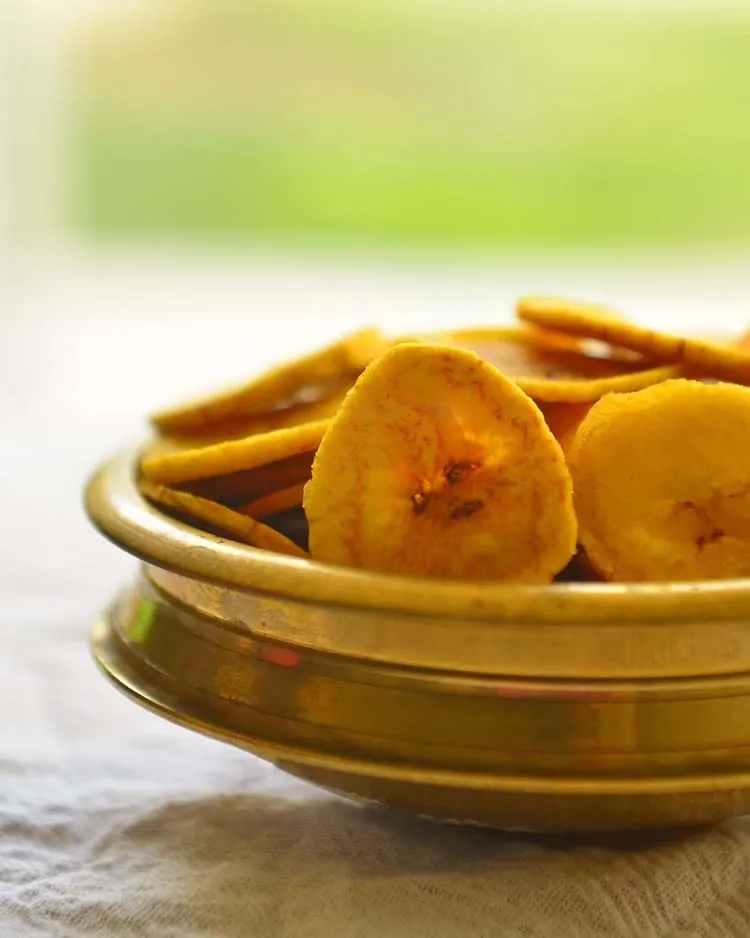
Onam in Kerala meant a respite from torrential rains. The monsoons are not quite over, but the nature is in bloom, its bounty filling the coffers. The paddy fields are harvested, fruits and veggies are aplenty and no more worries about irrigation! Bountiful harvest meant plenty of merriment. Though the agrarian culture that started all this is not predominant any more, the spirit still remains.
Last year I wrote about a few of my Onam memories – about food, flowers and friends. This year I am excited that Onam is not on a working day. Yay! Have to gather the troops and make sure that the front porch is decked for Maveli. There will be a pretty decent Sadya (feast) to make as well.
Talking of feasts, the typical south Indian feasts are a treat for vegetarians. No self serve business here, you sit down for the meals and wait to be treated to a variety of tastes and textures served on a banana leaf. Talk about eco-friendly convenience! Plantains, and bananas have an undeniable connection to the South Indian psyche. Every part of this plant is used – food to clothing to decoration comes from this unassuming plant.
It is no different in Kerala. The feasts are served on a banana leaf, and one of the first things to be served is the fried plantains. Everyone, especially in the villages, used to make Plantain chips or Ethakka Upperi at home. The sweet aromas of these golden discs frying in hot coconut oil drift across the yards into the village squares. Follow your noses and you will be treated to a wide variety of plantain chips salty, sugar coated, crisp and so on. This may not be a good time to be a plantain , but it sure is a great time to visit Kerala!
Now you know how I felt to see perfect raw plantains at the grocery store. About half a dozen of those lucky(!) fruits sat on my kitchen counter for a couple of days. I get the knife out and then the usual distractions of life gets in the way. A part of the reason Could be my reluctance to make fried food. That deep seated notion of fat being unhealthy is very hard to shake.
I do have a no fry, no mess baked version of Plantain Chips, but celebrations call for a bit more. The healthier(!) convenient versions are no match for the golden thin crisps of my childhood. The recipe is not complicated at all- a dash of turmeric and salt were the only seasonings used. Turmeric, I believe, was used to prevent browning and sticky aftertaste.
They still do it the same way in villages or when the families get together, but you could head over to the local bakery and grab a bag of fresh fried chips as well. Along the national highways there are rows of stalls selling these chips. These are the favorite rest stops of travelers, and tourists, especially if your are crossing the state lines. There you get to see large stoves set on the ground with equally large woks – enough to heat 5 to 10 gallons of oil at a time – waiting for freshly sliced plantains. Nearby the cook will be perched on a stool with the mandoline in hand.
The mandoline is the perfect tool for slicing the plantains. You get thin even slices very fast. If you don’t have one use a thin sharp knife. A chef’s knife is not what I prefer for this job, but a paring knife on the other hand works really well. Try to get as even thin slices as possible.
As you watch, the cook makes quick work of the plantains. He fishes one from the soaking water, and slices it right into hot oil. In under 10 seconds a whole plantain is turned to thin rounds bubbling away in hot oil. Few minutes in the oil and a few turns later they sprinkle saline water on top, bubbles and steam fills the air and when it all settles out comes the chips salted to perfection. This golden food for gods had come to our rescue during hostel days. Those days, the food in the mess hall was barely palatable, no wonder the warden’s side business of plantain chips flourished so much !!
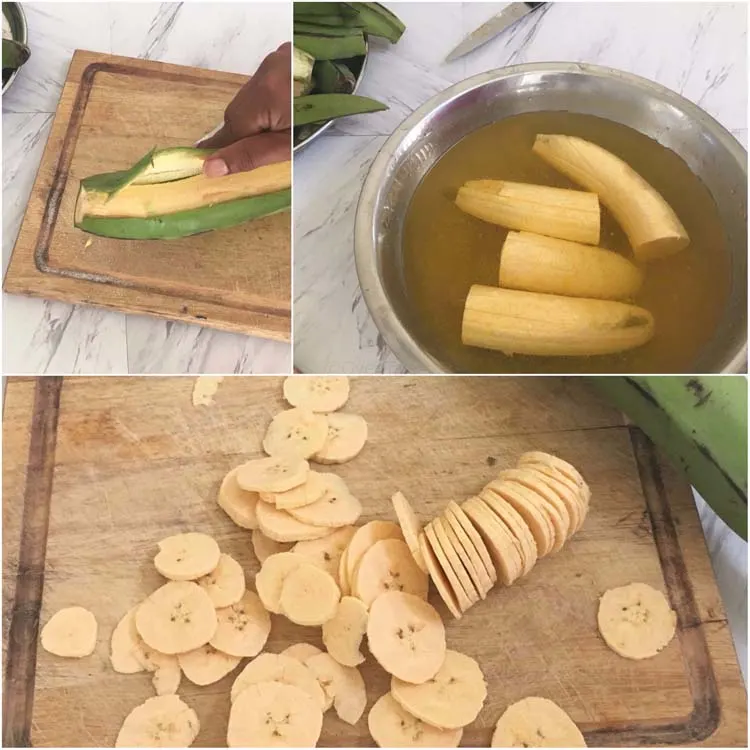
Wash and trim the ends of the plantain. Score and peel the skin off. Take care when you score, try not to cut into the fruit. The green plantain skin produces a sticky discharge and could stain your fingers. Use gloves or lightly oil the palms to prevent it. Immerse the peeled plantains in the turmeric water. This prevents sticky glue from forming. 10 to 20 minutes in the water is all you need, but I have seen them soaking for an hour or so.
Remove the plantains from the soaking liquid, pat dry with a kitchen towel and slice thin. A mandoline or paring knife is what you need here. Try to make as the slices as thin and as even as possible.
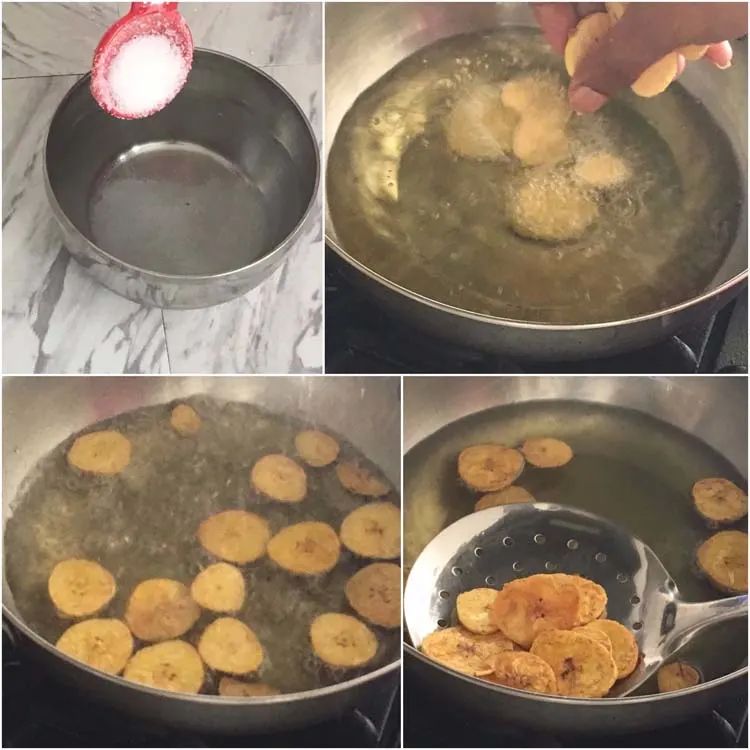
The traditional way to salt the chips is a little messy, but gives the best results. You start out by making a a very salty (almost saturated) saline solution. About 2 tsp salt dissolved in 1/4 C water should do the trick. If you have a spray bottle handy, fill it with the saline solution. Don’t worry you are not going to use it all, at least for the quantity that I am making here.
Heat enough coconut oil (nothing else compares) in a thick bottomed pan. When it has reached the smoking point put a handful of plantain slices into it. The pieces tend to stick together so be careful to separate them as you place them in hot oil . Let it fry for a minute or two and turn the chips. Repeat this a few times for even cooking on both sides. As the chip cooks you will notice that the bubbles around them become fewer and fewer. When the bubbling has becomes significantly less , reduce the heat and spritz (or sprinkle) with the prepared saline solution . Do not Pour saline solution into hot oi , just a gentle sprinkle or spritz is all that is needed. The oil will bubble up, when all that activity subsides, stir a few times and remove the chips from the hot oil .
Drain on kitchen towels . Cool and serve , or store in airtight containers.
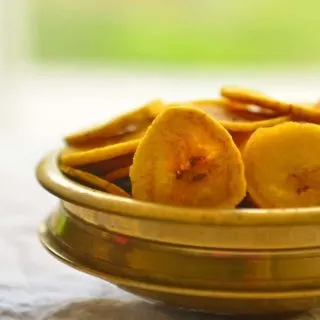
Traditional Plantain Chips
Ingredients
- 3 Green Plantains
- 1 - 2 Tsp Salt
- 1/4 Tsp Turmeric
- Oil Enough to Fry, preferably Coconut oil
- Water As needed
Instructions
- Take a large mixing bowl and pour 3 to 4 cups of water into . Add turmeric to the water and mix well. Set aside.
- Wash and trim the ends of the plantains. Score the skin lengthwise end to end. Be careful not to cut into the flesh inside. Pry the skin open carefully and remove the fruit. Immerse the peeled plantains in the turmeric water, cutting in half if needed. Let it soak in the turmeric water for 10 to 20 minutes.
- Mix salt in 1/4 C water to make a saturated (or very salty) saline solution.
- Heat a heavy bottomed pan (suitable for frying) and pour enough oil to cover the bottom in about 1 inch depth. While the oil is heating, take out a piece of plantain, pat dry with a kitchen towel and slice into thin rounds.
- When the oil has almost reached its smoking point, add a handful of sliced pieces int it. Take care not to crowd the pan.
- Keep the heat at medium and fry for a minute, using a slotted spoon turn the chips to evenly cook both sides. Repeat turning every minute or so.
- Once the chips begin to turn golden brown and bubbles seem to disappear, sprinkle (or spray) the saline solution on top(See Notes). This creates vigorous bubbling. Once the bubbles subside, turn the chips over once and remove from the oil.
- Spread on a kitchen towel to to drain the excess oil.
- Repeat with the remaining pieces of plantains.
- Cool to room temperature and or store in an airtight container for a few days.
Notes
-
- Safety First - stay away from the oil as you add the saline solution.
- Reduce the flame to low and cover with a lid to reduce splattering.
- Make the saline solution very salty. There is minimal splattering when a saturated saline solution is used.
- Do not pour saline water into the hot oil - think mist.
- If unsure, do not spritz with saline solution. Instead add salt to turmeric water, and sprinkle salt over hot chips as it is draining on the kitchen towels.
- Cooking time varies depending on the thickness of the chips.
- If the chips are thick, lower the heat , remove a piece from oil and crush with your fingers. If it cracks neatly, the chips are ready, otherwise fry over low heat for a few more minutes.
Important: Nutrition Values are estimates. Actuals vary based on ingredients and serving size.
Notes
- This is something I can’t stress enough – Safety First. Stay away from the pan as you spritz the saline solution.
- Keep kids and pets away. This is not a recipe for introducing cooking skills to kids.
- Do not leave the sliced plantains out in the open for long.
- Thicker chips need longer cooking times, start at medium temperature and lower it a few minutes into frying.
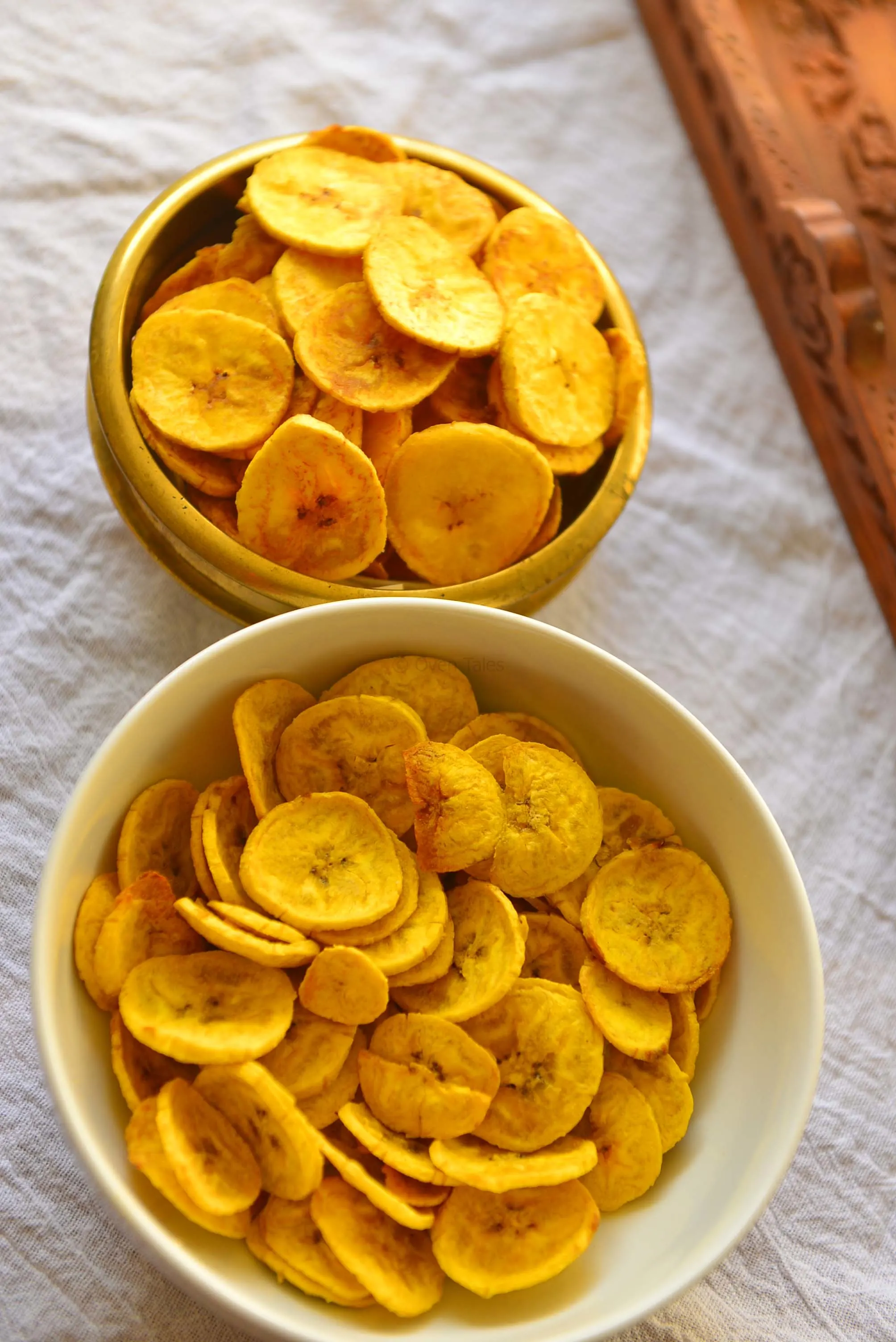
Here are the baked and fried chips side by side. The baked ones are in the white bowl – they look almost the same , but the fried version is more even and of course tastier.
All right now that I have the chips ready it is time to move on to the next step. Puli Inji is calling 🙂 .
Happy Onam !!!
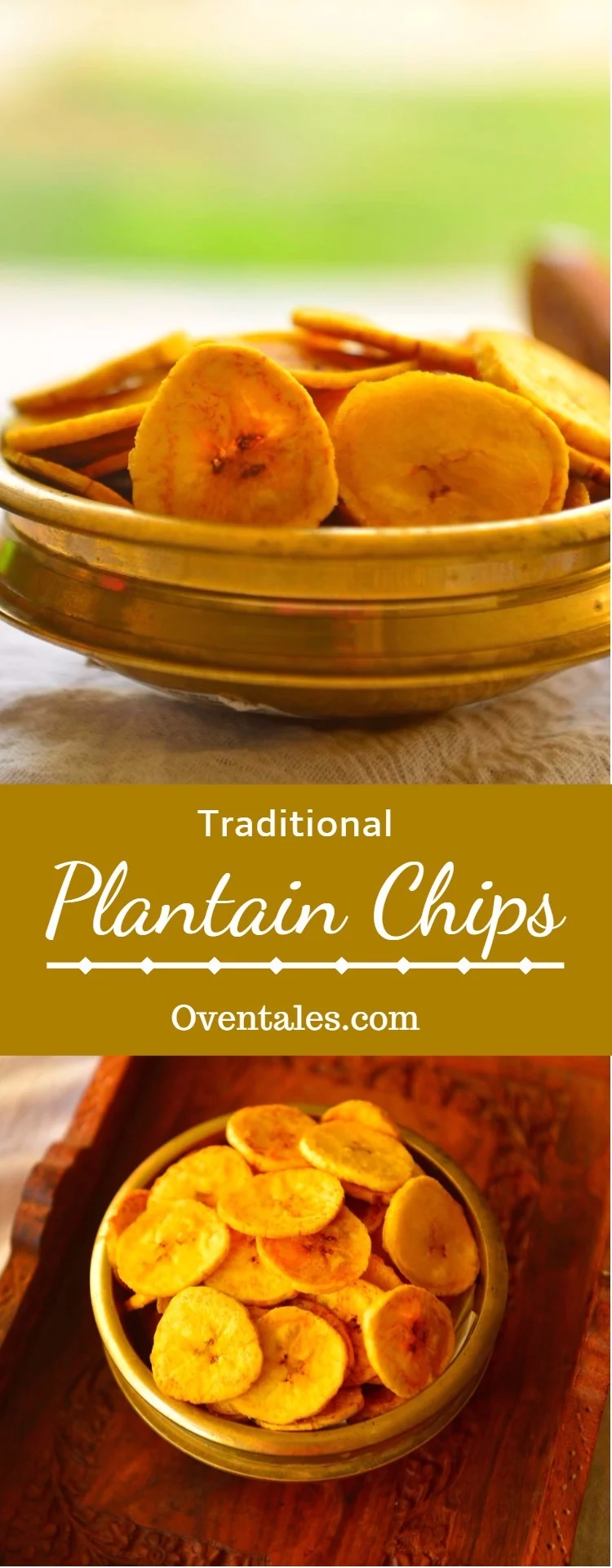

Roda
Monday 8th of January 2018
Love this recipe! Has some very good tips.
Syama
Tuesday 9th of January 2018
Thank you :-) .
Colby Papitto
Thursday 21st of September 2017
Amazing blog! Is your theme custom made or did you download it from somewhere? A design like yours with a few simple adjustements would really make my blog jump out. Please let me know where you got your design. Cheers